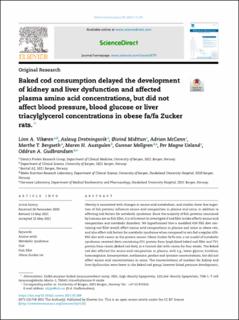Baked cod consumption delayed the development of kidney and liver dysfunction and affected plasma amino acid concentrations, but did not affect blood pressure, blood glucose or liver triacylglycerol concentrations in obese fa/fa Zucker rats.
| dc.contributor.author | Vikøren, Linn A. | |
| dc.contributor.author | Drotningsvik, Aslaug | |
| dc.contributor.author | Midttun, Øivind | |
| dc.contributor.author | McCann, Adrian | |
| dc.contributor.author | Bergseth, Marthe Tønder | |
| dc.contributor.author | Austgulen, Maren H. | |
| dc.contributor.author | Mellgren, Gunnar | |
| dc.contributor.author | Ueland, Per Magne | |
| dc.contributor.author | Gudbrandsen, Oddrun Anita | |
| dc.date.accessioned | 2021-11-19T07:48:06Z | |
| dc.date.available | 2021-11-19T07:48:06Z | |
| dc.date.created | 2021-08-11T16:21:22Z | |
| dc.date.issued | 2021 | |
| dc.identifier.issn | 0271-5317 | |
| dc.identifier.uri | https://hdl.handle.net/11250/2830386 | |
| dc.description.abstract | Obesity is associated with changes in amino acid metabolism, and studies show that ingestion of fish proteins influence amino acid composition in plasma and urine, in addition to affecting risk factors for metabolic syndrome. Since the majority of fish proteins consumed by humans are as fish fillet, it is of interest to investigate if cod fillet intake affects amino acid composition and metabolic disorders. We hypothesized that a modified AIN-93G diet containing cod fillet would affect amino acid compositions in plasma and urine in obese rats, and also affect risk factors for metabolic syndrome when compared to rats fed a regular AIN-93G diet with casein as the protein source. Obese Zucker fa/fa rats, a rat model of metabolic syndrome, received diets containing 25% protein from lyophilized baked cod fillet and 75% protein from casein (Baked cod diet), or a Control diet with casein for four weeks. The Baked cod diet affected the amino acid composition in plasma, with e.g., lower glycine, histidine, homoarginine, homocysteine, methionine, proline and tyrosine concentrations, but did not affect amino acid concentrations in urine. The concentrations of markers for kidney and liver dysfunction were lower in the Baked cod group, however blood pressure development, fasting and postprandial glucose, and hepatic triacylglycerol concentrations were similar to the Control group. To conclude, substituting 25% of dietary protein with baked cod fillet affected concentrations of some amino acids in plasma and delayed development of kidney and liver dysfunction, but did not affect blood pressure, glucose concentration or fatty liver. | en_US |
| dc.language.iso | eng | en_US |
| dc.publisher | Elsevier | en_US |
| dc.rights | Navngivelse 4.0 Internasjonal | * |
| dc.rights.uri | http://creativecommons.org/licenses/by/4.0/deed.no | * |
| dc.title | Baked cod consumption delayed the development of kidney and liver dysfunction and affected plasma amino acid concentrations, but did not affect blood pressure, blood glucose or liver triacylglycerol concentrations in obese fa/fa Zucker rats. | en_US |
| dc.type | Journal article | en_US |
| dc.type | Peer reviewed | en_US |
| dc.description.version | publishedVersion | en_US |
| dc.rights.holder | Copyright 2021 The Author(s). | en_US |
| cristin.ispublished | true | |
| cristin.fulltext | original | |
| cristin.qualitycode | 1 | |
| dc.identifier.doi | 10.1016/j.nutres.2021.05.009 | |
| dc.identifier.cristin | 1925409 | |
| dc.source.journal | Nutrition Research | en_US |
| dc.source.pagenumber | 72-83 | en_US |
| dc.identifier.citation | Nutrition Research. 2021, 92, 72-83. | en_US |
| dc.source.volume | 92 | en_US |
Tilhørende fil(er)
Denne innførselen finnes i følgende samling(er)
-
Department of Clinical Science [2395]
-
Registrations from Cristin [10402]

